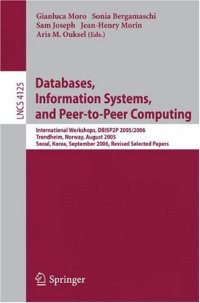
Ebook: Databases, Information Systems, and Peer-to-Peer Computing: International Workshops, DBISP2P 2005/2006, Trondheim, Norway, August 28-29, 2005, Seoul, Korea, September 11, 2006, Revised Selected Papers
- Genre: Education // International Conferences and Symposiums
- Tags: Database Management, Information Storage and Retrieval, Information Systems Applications (incl.Internet), Computer Communication Networks, Software Engineering, Artificial Intelligence (incl. Robotics)
- Series: Lecture Notes in Computer Science 4125 : Information Systems and Applications incl. Internet/Web and HCI
- Year: 2007
- Publisher: Springer-Verlag Berlin Heidelberg
- Edition: 1
- Language: English
- pdf
The aim of the International Workshop on Databases, Information Systems and P2P Computing was to explore the promise of P2P to o?er exciting new p- sibilities in distributed information processing and database technologies. The realization of this promise lies fundamentally in the availability of enhanced services such as structured ways for classifying and registering shared infor- tion, veri?cation and certi?cation of information, content distributed schemes and quality of content, security features, information discovery and accessib- ity, interoperation and composition of active information services, and ?nally market-based mechanisms to allow cooperative and noncooperative information exchanges. The P2P paradigm lends itself to constructing large-scale, complex, adaptive, autonomous and heterogeneous database and information systems, endowed with clearly speci?ed and di?erential capabilities to negotiate, bargain, coordinate and self-organize the information exchanges in large-scale networks. This vision will have a radical impact on the structure of complex organizations (business, sci- ti?c or otherwise) and on the emergence and the formation of social communities, and on how the information is organized and processed. The P2P information paradigm naturally encompasses static and wireless connectivity and static and mobile architectures. Wireless connectivity combined with the increasingly small and powerful mobile devices and sensors poses new challenges as well as opp- tunities to the database community. Information becomes ubiquitous, highly distributed and accessible anywhere and at any time over highly dynamic, - stable networks with very severe constraints on the information management and processing capabilities.
This book constitutes the thoroughly refereed postproceedings of the 3rd and the 4th International Workshop on Databases, Information Systems and Peer-to-Peer Computing, DBISP2P 2005 and DBISP2P 2006, held in Trondheim, Norway, in August 2005 and in Seoul, Korea, in September 2006, as satellite events of VLDB, the International Conference on Very Large Data Bases.
The 39 revised full papers presented together with 1 invited contribution were carefully selected during two rounds of reviewing and improvement. According to the sessions held in the two editions, the papers of DBISP2P 2005 are organized in topical sections on knowledge discovery and emergent semantics, query answering and overlay communities, indexing, caching and replication techniques, complex query processing and routing, semantic overlay networks, services, agents and communities of interest. The papers of DBISP2P 2006 are thematically divided into data placement and searching, semantic search, query processing and workload balancing, as well as continuous queries and P2P computing.